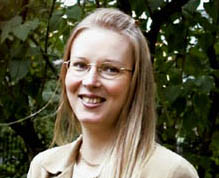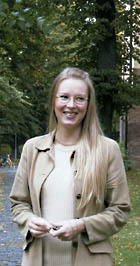User praises services of the archive
By Matleena Oksman
- A data archive is extremely important for a researcher, says Villiina Hellstén |
|
 |
Under its time of operation, the FSD has served people who need datasets. One of these clients is Villiina Hellstén who works as a researcher in the Department of Political Science at the University of Helsinki. At the moment, Hellstén is engaged in an EU-project that is to be concluded at the end of the year. In a book published in connection of the project there are articles in which datasets obtained from the FSD have been used, among them, datasets on municipalities reaching way back to the 1950's.
- At the department we have been collecting and complementing material for quite some time; for the last parliamentary and EU-elections, we obtained the datasets from the data archive, Hellstén says. We received an enormous amount of good background variables.
In addition to her own research projects Hellstén has received datasets for students preparing their master's theses. They have mainly utilised municipal datasets and Eurobarometers. Hellstén has used the latter in articles and in a course on quantitative methods she has led. In all, Hellstén says that she has used the services of the FSD quite a lot.
A hint from a colleague
For the first time Hellstén heard about the data archive from a colleague.
- I needed datasets in some of my studies and at that stage, one of the teachers in the method course directed me to the data archive, Hellstén reminisces. She visited the FSD's home pages, contacted Arja Tuuliniemi and got the materials she wanted. She's been in contact with Ms Tuuliniemi later on, too, mainly by e-mail and has nothing but positive things to say about the service she has received.
- Everything has always worked very smoothly. In the beginning, I couldn't exactly say what kind of datasets I was after. Instead, I told what kind of background variables I wanted. Arja went through the materials to find the variables and sent me the datasets.
- The service has always been swift and helpful.
When Hellstén first heard about the data archive, she wasn't all that excited.
She confesses to have thought to herself : oh no, things seem to get all too complicated.
- Should one haul oneself all the way to an archive when the datasets are needed this instant, here and now. Actually, the archive operates pretty much on a here-and-now principle.
Hellstén thinks that a data archive is for a researcher, if not irreplaceable, extremely important anyway.
 |
|
- An individual cannot set out to collect quantitative datasets because it would cost tens of thousands of marks. Projects are always financed by some big institute or organisation. Without a data archive it would be impossible to have access to the datasets. When institutions deposit datasets in the archive, they are available to any researcher who is interested in them.
There have been cases where a researcher has not obtained datasets he or she has wanted. Last Winter Hellstén tried to acquire data on the Youth Barometer commissioned by the Advisory Council for Youth Affairs which she would very much like to use in method teaching. |
-The truth is that student don't like quantitative research methods. They find them difficult. Moreover,. the Eurobarometer is a bit dull, one can create only certain kinds of research positions based on it. The reason why Hellstén would like to use the Youth barometer is that it deals with matters that are close to the students. The Youth barometer is prepared by Statistics Finland, however, and in Hellsténs mind, is property of it. She is confident, though, that the data archive will eventually obtain the dataset.
- Also in this sense, an institution like the data archive is a good thing because one can imagine that Statistics Finland might well hand over its datasets to an archive, Hellstén says.
Top of page | Privacy Policy
|